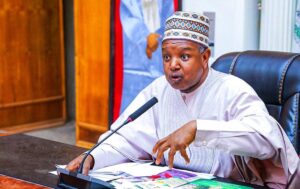In response to mounting international criticism and sustained advocacy from civil society groups, the Federal Government of Nigeria has begun formal engagement with diaspora investors affected by the controversial demolition of the $250m WIN HOMES Estates in Okun Ajah, Lagos.
The move marks a significant shift in the Tinubu administration’s approach to investment diplomacy and diaspora relations.
The development was confirmed in a communiqué issued following a world press conference convened by a coalition of civil society organisations.
The document, made available to newsmen, was signed by Stella Okengwu, Dr. Kimberly Stark, Faduri Oluwadare Joseph, Mr. Ovie Aweghogho, and Oluwasegun Bamigbola Bovi.
According to the communiqué, stakeholders at the event including diaspora representatives and civil society leaders welcomed President Bola Ahmed Tinubu and Minister of Works David Umahi’s decision to open dialogue, describing it as a step toward justice, healing, and restitution.
The demolition of the WIN HOMES Estates on October 5, 2024, as part of the Lagos-Calabar Coastal Highway realignment, sparked outrage across Nigeria’s 50-million-strong diaspora.
Many investors, mostly Nigerians living abroad, alleged that the demolition was carried out without adequate notice, legal due process, or compensation leading to a reported 30% drop in diaspora-led real estate investments.
Speaking at the conference, Stella Okengwu described the government’s decision to initiate dialogue as a “bold step towards national healing.”
“This is not just about the loss of buildings,” she said. “It’s about trust, protection, and the
message Nigeria sends to its global partners.”
Read Also
The conference, organized by the Coalition of Civil Society of Nigeria, underscored the vital role the diaspora plays in national development. WIN HOMES Estates had been a flagship project backed by diaspora funding, creating jobs, stimulating local economies, and fostering cross-cultural collaboration.
Signatories emphasized that their advocacy has remained peaceful, legal, and patriotic.
Dr. Kimberly Stark said: “We have always stood by the Renewed Hope Agenda. We now urge the government to fulfill that promise by ensuring justice, compensation, and safeguards for diaspora investors.”
The stakeholders called for an independent valuation of the demolished properties and full compensation for affected investors.
They also proposed the establishment of a Diaspora Investment Protection Desk within key government ministries to institutionalize investment safeguards and prevent similar incidents in the future.
Civil society leaders applauded the federal government’s willingness to engage, describing the move as a watershed moment for Nigeria’s investment climate.
They argued that formalizing protections for diaspora investors could reverse capital flight, improve Nigeria’s ease-of-doing-business rankings, and unlock billions of dollars in future investment.
The demolished WIN HOMES Estates had been envisioned as a model of inclusive development, bringing together Nigerians from various ethnic and professional backgrounds in a shared mission to contribute to national rebuilding from abroad.
Ovie Aweghogho, one of the signatories, said: “We are not just investing in real estate. We are investing in Nigeria’s future. If that investment isn’t protected, it sends the wrong message to the next generation of Nigerians abroad.”
With the federal government now extending an olive branch, stakeholders expressed cautious optimism that a new chapter is beginning—one in which diaspora capital is not only welcomed but also legally and structurally safeguarded.





